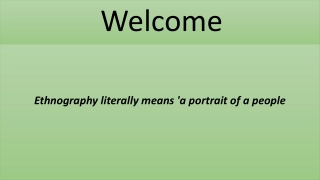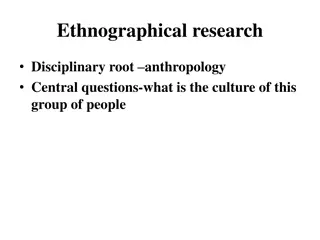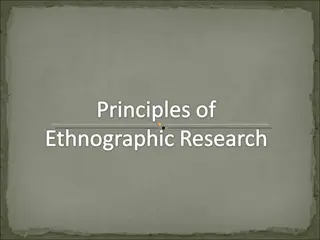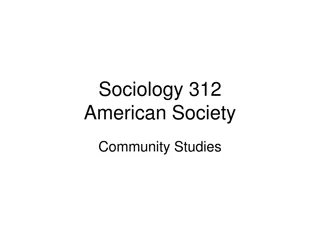Understanding Ethnographic Research Design
Ethnography, a qualitative research method, involves studying people and cultures through observation and interaction in their natural environment. Researchers immerse themselves in the subject group to gain insights, interpret results through a cultural lens, and document findings through detailed
1 views • 21 slides
Exploring Ethnographic Fieldwork and Writing Techniques
Dive into the world of ethnography with a comprehensive guide covering topics such as participant observation, working with informants, reflexive approaches, and more. Discover the ins and outs of conducting fieldwork, writing ethnographic studies, and developing a reflexive approach in your researc
0 views • 27 slides
Conducting Online Ethnography for Gathering Insights
Conduct online ethnography to gather insights from online communities using a relevant online platform. Follow the provided template to collect field notes, focusing on your design problem or the Designing Space Travel brief. Utilize images provided for reference and guidance. Share your work follow
3 views • 8 slides
Understanding Netnography: A Comprehensive Guide for Tourism Research
Delve into the world of netnography, a combination of Internet and ethnography, to explore virtual communities and online interactions. Learn about the methods, advantages, and ethical considerations of conducting netnographic studies for tourism research purposes, including data collection, analysi
4 views • 11 slides
Understanding Ethnographic Research in Anthropology
Ethnographic research in anthropology focuses on studying cultures through direct observation in natural environments. It aims to gain insights into how users interact with their surroundings, providing in-depth understanding of social interactions, behaviors, and perspectives. Methods include direc
0 views • 22 slides
Evolution of Bureaucratic Caring Theory in Nursing
Discussion of the Theory of Bureaucratic Caring by Marilyn A. Dee Ray, focusing on the systematic integration of purposeful concepts and the development process of the BCT model. The research explores the meaning of caring within institutional culture using methodologies like ethnography and phenome
0 views • 29 slides
Understanding Ethnography: Art and Science of Cultural Description
Ethnography is the method of describing a group or culture through up-close experience and participation. This social science research technique focuses on contextual, unobtrusive, and collaborative characteristics that involve interpretative analyses and organic interactions. Data collection is uns
1 views • 14 slides
Understanding Research Methods and Participants
Explore the differences between method and methodology, types of research methods and methodologies, characteristics of participants in studies, and inclusion/exclusion criteria. The content elaborates on the importance of rationale, justification, and techniques/tools used in research, along with e
0 views • 17 slides
Greek Historiographers: Pioneers in Historical Literature
Greek scholars significantly influenced historiography, blending geography and ethnography with historical writings. From Hesiod's mythical accounts to Hecataeus' critical approach and Herodotus' detailed narratives of the Persian Wars, they laid the foundation for the study of history in Greece, em
0 views • 8 slides
Understanding Epistemic Network Analysis in Data Studies
Epistemic Network Analysis (ENA) is a method for studying relationships between elements in coded data with various applications. It involves analyzing nodes as occurrences of codes and links as co-occurrences of codes. Using examples like analyzing quitting behavior in a game, ENA can compare group
0 views • 30 slides
Anthropological Study of Religion: Exploring Cultural Diversity
This chapter delves into the anthropological study of religion, emphasizing cultural relativism and holism. It explores various branches of anthropology, such as cultural studies and archaeology, and discusses the holistic approach anthropologists take when studying smaller populations to understand
0 views • 34 slides
Understanding Ethnography: Documenting Everyday Experiences
Ethnography involves observing and interviewing individuals to document their daily lives. Researchers aim to capture the nuances of culture, behaviors, and perspectives through in-depth participant observation. Using emic and etic perspectives, ethnographers contextualize their findings and provide
0 views • 17 slides
The Phenomenology of Temperature Awareness in Distance Running
Researchers at the University of Gloucestershire explore the embodied consciousness of distance runners, focusing on thermoception and temperature regulation. Utilizing sociological phenomenology and phenomenological ethnography, the study delves into the sensory experiences of runners, emphasizing
0 views • 29 slides
Exploring Anthropology of Art: Perspectives and Studies on Cultural Expressions
This text delves into the intersection of anthropology and art, focusing on the importance of anthropological approaches in studying artistic subjects. It covers various topics such as the nature of art, methodologies, theoretical frameworks, and case studies. The discussed themes include the role o
0 views • 7 slides
Analysis of Gender, Agency, and Nationalism in Feminist Ethnography
Explore the complexities of gender, agency, and Indian nationalism through feminist ethnography, delving into themes of family, silence, self-staging, and shifting identities. The analysis emphasizes the significance of women's agency in shaping their identities and resisting societal norms, highlig
0 views • 5 slides
Understanding Community Studies in American Sociology
Community studies in American sociology focus on analyzing life within specific neighborhoods, dating back to the 1920s. This field employs various research methods to explore social aspects extensively, building on anthropological urban ethnography. Early studies by influential figures like W.E.B.
0 views • 65 slides















